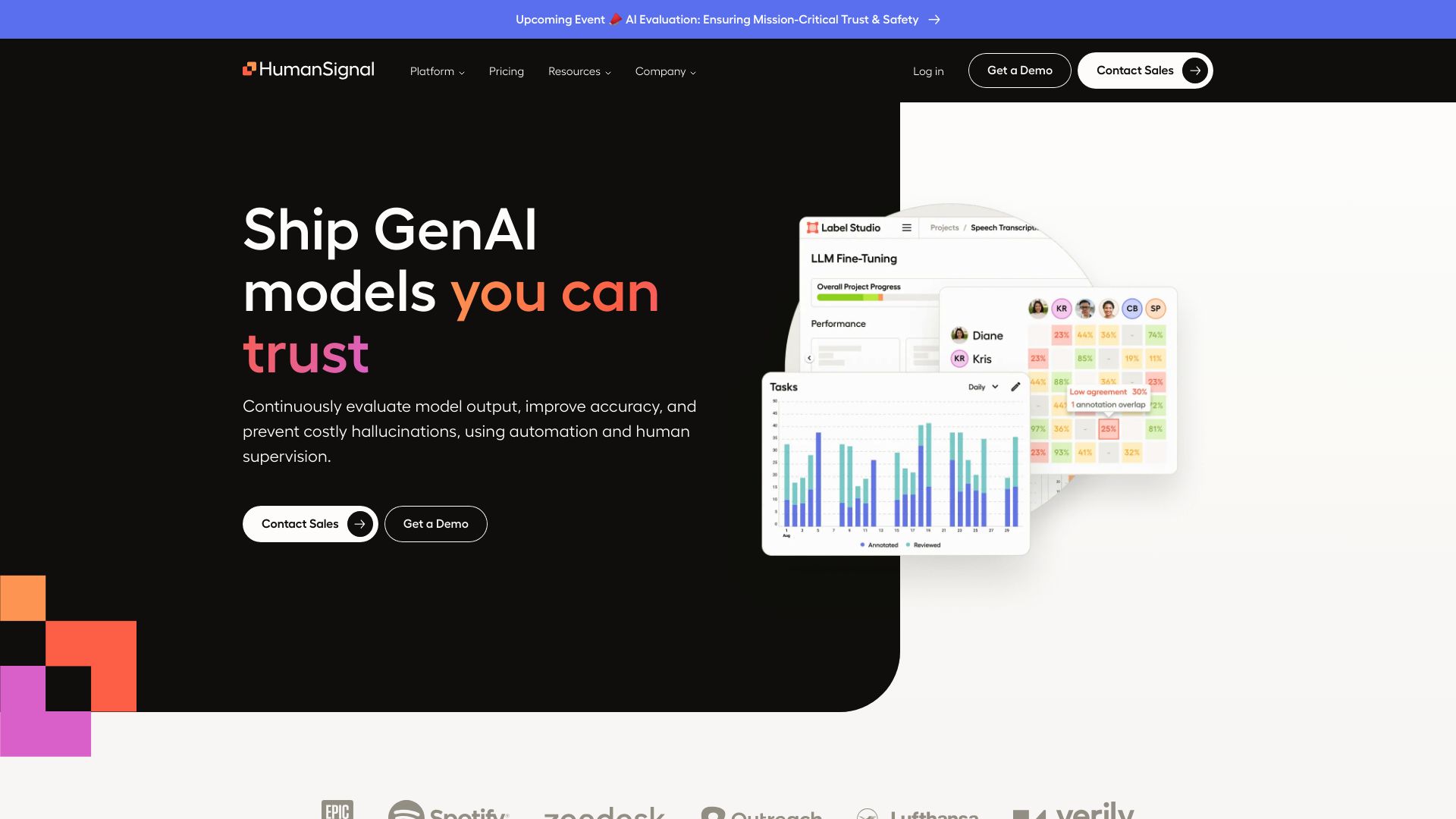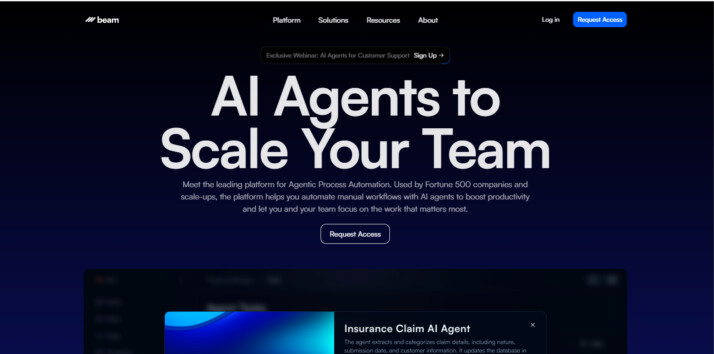Adala vs. Beam AI: Comparing Autonomous Data Labeling and Task Automation
AI agents revolutionize how businesses operate, automate tasks, and process data. Adala vs. Beam AI stand out in this field, each offering unique approaches to AI-driven solutions. Adala specializes in autonomous data labeling, empowering data scientists with intelligent agents that evolve through iterative learning. Beam AI focuses on generative AI agents for task automation across industries, emphasizing continuous adaptation and efficiency. This comparison delves into the core features, strengths, and limitations of both platforms, exploring their implications for businesses seeking to harness AI’s power. We’ll examine how these tools stack up against each other and against SmythOS, our comprehensive AI agent development platform, to help you make an informed decision for your AI initiatives.
Adala Overview
Adala transforms data labeling with autonomous AI agents. This open-source framework empowers data scientists to create intelligent agents that learn from ground truth datasets, evolving into efficient prediction engines for large-scale labeling tasks.


Adala excels in handling diverse data types, including text, video, and images. Its agents continuously improve through iterative learning, enhancing accuracy and efficiency in data classification and labeling. The platform integrates seamlessly with popular AI models like GPT-4 and supports various APIs, offering flexibility for customized workflows.
Adala transforms data labeling with autonomous AI agents… empowers data scientists to create intelligent agents that learn from ground truth datasets, evolving into efficient prediction engines for large-scale labeling tasks.
A standout feature of Adala is its focus on human-AI collaboration. The framework emphasizes aligning AI models with human values, ensuring reliable and trustworthy agents. This approach combines the speed of automation with the nuanced understanding of human experts, resulting in high-quality labeled datasets.
While Adala offers powerful capabilities for autonomous data labeling, it may require some technical expertise to fully leverage its potential. The platform lacks a visual builder or no-code editor, which could pose challenges for non-technical users. However, its open-source nature encourages community-driven development and customization.
Adala’s strengths in scalability, multimodal support, and integration capabilities position it as a valuable tool for data-centric AI development. Its emphasis on explainability and transparency addresses growing concerns about AI ethics and reliability. For organizations dealing with large-scale data labeling challenges, Adala presents a compelling solution that combines efficiency with human-centered design.
Beam AI Overview
Beam AI specializes in developing generative AI agents for task automation. Their Agentic Process Automations (APAs) tackle repetitive manual tasks across various industries, boosting productivity and efficiency. These autonomous agents excel in data extraction, customer inquiry management, compliance automation, and order optimization.


Beam AI Website Screenshot
Beam AI’s platform stands out for its continuous learning capabilities. Agents adapt and improve over time, enhancing precision and efficiency through iterative interactions with data. This adaptability makes Beam AI particularly valuable for organizations seeking long-term automation solutions that evolve with their needs.
Beam AI’s platform stands out for its continuous learning capabilities. Agents adapt and improve over time, enhancing precision and efficiency through iterative interactions with data.
The company’s AI-native approach underpins all their solutions, emphasizing sustainability and speed. Beam AI aims to minimize steps in achieving goals, reducing human carbon footprints while saving time and enhancing efficiency. Their international team collaborates globally, working towards a future led by artificial general intelligence (AGI).
Beam AI agents feature advanced conversational interfaces for seamless interaction and efficient task management. They integrate with existing internal systems to plan and execute workflows, providing comprehensive automation solutions. However, the platform may have limitations in visual building tools and no-code options, potentially requiring more technical expertise for implementation.
For businesses looking to automate complex workflows and improve processes over time, Beam AI offers a robust solution. Its focus on continuous learning and adaptation positions it as a forward-thinking choice in the rapidly evolving field of AI-driven automation.
Feature Comparison
Adala and Beam AI offer distinct approaches to AI agent development, with key differences in their core components and security features. Adala excels in autonomous data labeling, providing a framework for agents to learn from ground truth datasets and evolve into efficient prediction engines. Its strength lies in handling diverse data types and continuous improvement through iterative learning. In contrast, Beam AI focuses on generative AI agents for task automation across industries, with a emphasis on Agentic Process Automations (APAs) for repetitive manual tasks.
Regarding core components, Adala lacks a visual builder or no-code editor, potentially limiting accessibility for non-technical users. Beam AI similarly does not offer these features, requiring more technical expertise for implementation. However, Beam AI’s agents feature advanced conversational interfaces and integrate with existing internal systems, providing a more comprehensive automation solution. Both platforms support multimodal capabilities and problem-solving, but Beam AI’s focus on continuous learning and adaptation gives it an edge in long-term efficiency gains.
In terms of security, Adala emphasizes data encryption and OAuth support, while specific information about Beam AI’s security features is limited in the provided context. This gap in security information for Beam AI could be a concern for organizations prioritizing data protection and access control in their AI implementations.
Feature Comparison Table
| Adala | Beam AI | SmythOS | |
|---|---|---|---|
| CORE FEATURES | |||
| Visual Builder | ❌ | ❌ | ✅ |
| No-Code Options | ❌ | ❌ | ✅ |
| Debug Tools | ✅ | ❌ | ✅ |
| Multimodal | ✅ | ❌ | ✅ |
| Audit Logs for Analytics | ❌ | ✅ | ✅ |
| SECURITY | |||
| IP Control | ❌ | ✅ | ✅ |
| COMPONENTS | |||
| Data Lakes | ❌ | ❌ | ✅ |
| DEPLOYMENT OPTIONS (EMBODIMENTS) | |||
| Staging Domains | ❌ | ✅ | ✅ |
| Production Domains | ❌ | ✅ | ✅ |
| Deploy as Scheduled Agent | ❌ | ✅ | ✅ |
| DATA LAKE SUPPORT | |||
| Hosted Vector Database | ✅ | ❌ | ✅ |
| Sitemap Crawler | ❌ | ❌ | ✅ |
| YouTube Transcript Crawler | ❌ | ❌ | ✅ |
| URL Crawler | ✅ | ❌ | ✅ |
Best Alternative to Adala and Beam AI
SmythOS stands out as the superior alternative to Adala and Beam AI, offering a comprehensive and user-friendly platform for AI agent development and deployment. We provide a robust set of features that address the limitations of both competitors, making AI automation accessible to a wider range of users while maintaining the power and flexibility needed for complex applications.
Our visual builder and no-code options set SmythOS apart from Adala and Beam AI. While both competitors lack these essential features, we empower users of all technical backgrounds to create sophisticated AI agents without extensive coding knowledge. This democratization of AI development accelerates innovation and allows businesses to quickly implement AI solutions across various departments.
SmythOS excels in its extensive integration capabilities and deployment options… We offer deployment as APIs, webhooks, site chats, and scheduled agents, providing the flexibility that Beam AI’s Agentic Process Automations (APAs) lack.
SmythOS excels in its extensive integration capabilities and deployment options. Unlike Adala, which focuses primarily on data labeling, our platform supports a wide range of AI applications and integrates seamlessly with existing systems. We offer deployment as APIs, webhooks, site chats, and scheduled agents, providing the flexibility that Beam AI’s Agentic Process Automations (APAs) lack. This versatility ensures that our AI agents can be tailored to specific organizational needs across industries.
Our platform’s emphasis on security and scalability addresses critical concerns that both Adala and Beam AI struggle to fully resolve. We implement robust data encryption, OAuth support, and IP control features, ensuring that your AI implementations meet the highest standards of data protection and access management. Additionally, our scalable architecture allows for seamless growth as your AI needs expand, a crucial factor for businesses looking to leverage AI for long-term success.
By choosing SmythOS, you gain access to a comprehensive suite of tools that surpass the offerings of both Adala and Beam AI. Our platform combines the best of both worlds – the data handling capabilities that Adala excels in and the process automation focus of Beam AI – while adding crucial features like visual building, extensive deployment options, and advanced security measures. With SmythOS, we’re not just offering an alternative; we’re providing a superior solution that will drive your AI initiatives forward with unparalleled efficiency and effectiveness.
Conclusion
Adala and Beam AI offer powerful solutions for AI-driven automation, each with unique strengths. Adala excels in autonomous data labeling, providing a framework for agents to evolve through iterative learning. Its ability to handle diverse data types positions it well for organizations dealing with complex datasets. Beam AI, on the other hand, focuses on generative AI agents for task automation across industries, with a strong emphasis on continuous learning and adaptation.
While both platforms demonstrate impressive capabilities, they may require technical expertise to fully leverage their potential. This could pose challenges for organizations seeking more accessible, no-code solutions. Additionally, the limited information on Beam AI’s security features might be a concern for businesses prioritizing data protection.
In contrast, SmythOS emerges as a superior alternative, offering a comprehensive suite of features that address the limitations of both Adala and Beam AI. Our platform provides a user-friendly drag-and-drop interface, making AI agent creation accessible to users of all technical backgrounds. We support a vast array of integrations, including over 300,000 APIs and tools, enabling seamless incorporation into existing workflows. SmythOS also prioritizes security and scalability, ensuring enterprise-grade protection and performance.
For those looking to harness the power of AI agents without compromising on ease of use or functionality, we invite you to explore our diverse range of AI-powered agent templates. These templates cover multiple business categories and offer a quick start to revolutionizing your workflow. To experience the full potential of SmythOS and see how it can transform your AI initiatives, create a free SmythOS account today. With our 30-day money-back guarantee, you can dive into AI automation risk-free and discover why SmythOS is the ultimate choice for building and deploying AI agents anywhere.
Last updated:
Disclaimer: The information presented in this article is for general informational purposes only and is provided as is. While we strive to keep the content up-to-date and accurate, we make no representations or warranties of any kind, express or implied, about the completeness, accuracy, reliability, suitability, or availability of the information contained in this article.
Any reliance you place on such information is strictly at your own risk. We reserve the right to make additions, deletions, or modifications to the contents of this article at any time without prior notice.
In no event will we be liable for any loss or damage including without limitation, indirect or consequential loss or damage, or any loss or damage whatsoever arising from loss of data, profits, or any other loss not specified herein arising out of, or in connection with, the use of this article.
Despite our best efforts, this article may contain oversights, errors, or omissions. If you notice any inaccuracies or have concerns about the content, please report them through our content feedback form. Your input helps us maintain the quality and reliability of our information.
